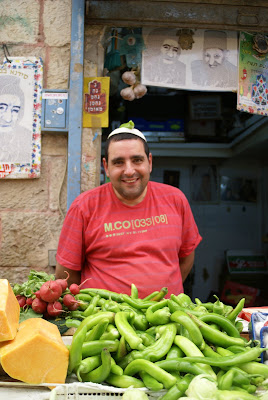




After my week of cob building in Beer Milka, I spent a week in the tiny Moshav of Shokeda living on Batzion's permaculture farm. Batzion moved from the States 8 years ago to Israel and is now on her fourth year of developing this permaculture farm. Permaculture is an approach to designing human settlements and agricultural systems that mimic the relationships found in natural ecologies. Permaculture is sustainable land use design, often using patterns that occur in nature to maximise effect and minimise work. Elements in a system are viewed in relationship to other elements, where the outputs of one element become the inputs of another. Within a Permaculture system, work is minimised, “wastes” become resources, productivity and yields increase, and environments are restored. Permaculture is based on 12 principles (http://permacultureprinciples.com/principles.php) that can be applied to any environment, at any scale from dense urban settlements to individual homes, from farms to entire regions.
I learned less than I would have liked during my week on this farm (between distractions within the family and a day of fasting) but I was able to share with them my knowledge of ecological design and begin them on an earthen building project to carry on after I left. I did see a small window into how a permaculture farm functions. For example, their compost toilet is portable. They build a deep hole in the ground and place the compost toilet over it. After several months of filling the same location (human nitrogen plus straw or sawdust) the entire structure is moved to a new location. The first continues to compost until eventually a tree is planted to make use of all of the nutrients. There are long pipes leading out of the shower and the kitchen sink: one leading to the roots of the banana trees and the other to the willow and surrounding tomato plants. Passion fruit vines are growing up the side of the house and over the porch roof, providing cooling for the roof and delicious fruit. There is a solar cooker outside--a box lined with tin foil and covered in glass, to slowly cook or heat food during the day. Food is mostly from local farmers, and flour they grind themselves. Batzion made her own rocket stove, developed originally for third world countries to use small twigs to produce a very high combustion efficiency for cooking. She grows plants that are native to the area and that take little to no extra watering, she grows medicinal herbs to hopefully eventually bring affordable relief to all income levels, and she uses her own seeds and clippings to grow plants affordably.
After a week with Batzion's family, I head up North with another WWOOFer from her farm. While initially headed for water hiking in Nahal Yehudiya in the Golan Heights, several detours changed our weekend plans. First we ended up on the beach in Palmakhim, a little south of Tel Aviv, for a nature party. This beach was a wild beach, and for years people have been fighting developers from building a hotel on the beach front which would ultimately take the beach away from the hundreds that come regularly now and enjoy it. Recently the battle was won--no hotel will be built--and in celebration there was a big, day long rave on the beach. We arrived around 13:00 to people already dancing under tents. We set up our tent right on the beach right on the outskirts of the action, and shared some food with our neighbors (one had studied agriculture and knew Yotam and Tammi, the family I stayed with in Rotem, and their earthbag building project!) We took a swim in the sea, and then enjoyed the party of dancing into the night. The next day we enjoyed some Yemenite food and barbecue with our neighbors on the other side (a few families who camp every week on the beach, quite normal here,) and left to go further north. We ended up visiting Heifa instead, slightly easier to reach than the water hiking in the Golan, and spent the day visiting the Baha'i Gardens and nearby Akko. The Bahai'i Gardens were built for the Baha'i faith, founded in 19th century Persia. It emphasizes the spiritual unity and equality of all humankind and recognizes all profits (Muhammad, Jesus, Buddha, Abraham, etc.) and two of its own. There are 6 million Baha'i and, while the Baha'i religion's most important buildings and holy sites lie in Akko and Haifa, Israel, Baha'i are not suppose to live in Israel near their holy sites and instead are scattered all throughout the world (from Persia to Australia and Chile to the US,) usually coming to Israel for one to two years as volunteers at the gardens. We then headed to Akko, 20 minutes further North along the coast, a city of about 40,000 with an overall Jewish majority but a distinct Muslim feel within the walls of the old city. It is one of Israel's oldest continuously inhabited cities; it's name appears in Egyptian writings from the 16th century BC. We walked through the lively Shook, or market, and arrived 1/2 hour after Hommus Said's close to miss out on some of the best hommus in Israel (sigh.) but got some fabulous falafel on the street. I bought a full kilo of the amazing Za'atar that I ate daily in Jordan--a mix of dried spices, sesame seeds, and salt--and took in the middle eastern feels of the boisterous market. Now I'm in Jerusalem staying with a couch surfer, ready to begin a new epoch of adventure!
No comments:
Post a Comment